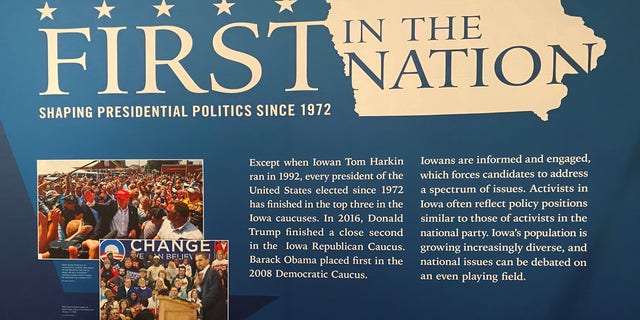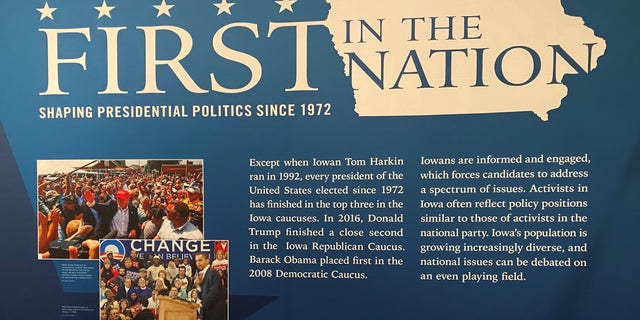
Democratic Party officials gathering the nation’s capital this week on a mission to revamp the top of their 2024 presidential nominating calendar, a move that could have major consequences for the party far beyond their primary schedule in the next White House race.
On the agenda when the Democratic National Committee’s Rules and Bylaws Committee convenes is whether Iowa and New Hampshire — which have held the first two contests in the DNC’s presidential primary and caucus schedule for half a century — will keep their traditional lead-off positions, or if the party will shake up the order and look to a more diverse state to kick off the cycle.
The meeting was originally scheduled to take place in early September but was delayed until after the midterm elections, amid concerns that changes in the calendar would potentially wound Democrats facing challenging re-elections. In recent days, DNC officials on the crucial panel have been bombarded with calls, texts, and emails amid a deluge of public lobbying and behind the scenes jockeying.
For years Democrats have knocked Iowa and New Hampshire as being unrepresentative of the party as a whole for being largely White with few major urban areas, while the Democratic voting bloc has attracted more minorities over the past several decades. Nevada and South Carolina — which currently vote third and fourth in the calendar — are much more diverse than either Iowa or New Hampshire.
RNC STICKS WITH TRADITION, MAKING NO CHANGES TO 2024 PRIMARY CALENDAR

The Iowa Caucuses display at the State Historical Museum of Iowa, on Jan. 15, 2020 (Fox News)
Complicating matters, Nevada Democrats last year passed a bill into law that would transform the state’s presidential caucus into a primary and aimed to move the contest to the lead-off position in the race for the White House, ahead of Iowa and New Hampshire. And compounding Iowa’s issues was the botched reporting of the 2020 caucuses, which became a national embarrassment for Iowa Democrats as well as the DNC. Michigan and Minnesota are pushing to replace Iowa as the Midwestern representative among the early voting, or so-called carve out, states.
Earlier this year the DNC moved to require Iowa, New Hampshire, Nevada and South Carolina to reapply for early state status in the 2024 calendar. Other states interested in moving up to the top of the calendar also were allowed to apply for an early position. The DNC is also considering allowing a fifth state to obtain carve-out status. The four existing early states plus 13 others are still in contention to land pre-window status.
DEMOCRATS PUNT ON UPENDING 2024 NOMINATING CALENDAR UNTIL AFTER MIDTERMS
Democratic sources argue it’s pretty clear that Iowa will lose its position for three main reasons: First, it holds a caucus, not a primary, which the DNC has been phasing out in recent cycles. The delayed reporting of the 2020 presidential caucus results were a major embarrassment, and while Iowa was once a general election battleground, it’s shifted increasingly red in recent years.
Nevada has made a major push to take Iowa’s place as the lead-off state, touting its diversity. But a sticking point is New Hampshire’s state law that protects its primary as first-in-the-nation, giving the secretary of state the power to move up the date of the contest to protect primary tradition. A showdown would likely occur if kept DNC kept New Hampshire second on the calendar but moved another state’s primary to the top of the order.

‘Welcome to Fabulous Las Vegas’ sign (Fox News Digital/Teny Sahakian)
“The big questions that the committee needs to decide are whether New Hampshire or Nevada lead off the Democrats’ presidential nominating calendar and which Midwestern state — Michigan or Minnesota — replaces Iowa,” a source with knowledge of the Rules and Bylaws Committee’s thinking told Fox News.
As for adding a fifth state to the group of early voting states, the source told Fox News “I don’t think there’s much of a desire for a fifth state in the carve out calendar… it is still on the table but no one is talking about it.”
FIRST ON FOX: DESANTIS COMING OUT WITH NEW BOOK IN FEBRUARY AMID 2024 SPECULATION
The Rules and Bylaws Committee meeting formally kicks off on Friday, with a decision likely coming on Saturday.
Ahead of the meeting, the most powerful player in the process — President Biden — had yet to weigh in on the calendar.

President Joe Biden delivers remarks on the bipartisan infrastructure law on April 19, 2022 in Portsmouth, New Hampshire. (Photo by Scott Eisen/Getty Images) (Scott Eisen)
The president is the titular head of the Democratic Party and sources say they expect him and his top advisers to have a voice in this process, but they don’t expect any formal announcement from White House.
But with Biden likely to seek a second term and a heavily contested presidential primary unlikely if the president runs for re-election, any changes in the nominating calendar would arguably be felt more in the 2028 cycle rather than in 2024.
Iowa Democratic Party chair Ross Wilburn, as he fights to save his state’s lead off position, argued in a letter to the Rules and Bylaws Committee on Monday that there are issues more consequential than the primary calendar at play.
WHEN WILL TRUMP HOLD FIRST 2024 RALLY; PENCE HEADING BACK TO NEW HAMPSHIRE
“It’s critical that small rural states like Iowa have a voice in our Presidential nominating process. Democrats cannot abandon an entire group of voters in the heart of the Midwest without doing damage to the party for a generation. We need to win states like Iowa in order to grow our Democratic majorities and win the White House,” Wilburn wrote.
But Mike Czin, a longtime Democratic strategist and veteran of former President Barack Obama’s 2012 re-election campaign and the Democratic National Committee, noted that “there’s broader reasons for the party to move on from the Iowa caucus and there are numerous states that can fill that important role.”
“Iowa had numerous opportunities to reform and improve their election administration of the caucus and they failed. It wasn’t just in 2020. They had issues for years. Their opportunity to modernize has passed,” Czin said.

New Hampshire has held the first-in-the-nation presidential primary for a century. A sign outside the state capitol in Concord, N.H. marks the state’s treasured primary status. (Fox News )
In New Hampshire, there’s quiet confidence that they’ll retain their century old role as the first-in-the-nation presidential primary state.
“We’ve said right from the get-go that we feel New Hampshire is going to remain first-in-the-nation,” longtime state Democratic Party chair Ray Buckley told Fox News last week. “New Hampshire does a terrific job in hosting the first in the nation primary and should continue to do so. End of story.”
CLICK HERE TO GET THE FOX NEWS APP
While the Democrats get ready to battle over their nominating calendar, there’s little drama in the GOP.
The Republican National Committee voted earlier this year to make no changes to their current order of Iowa, New Hampshire, South Carolina and Nevada leading off their schedule.








